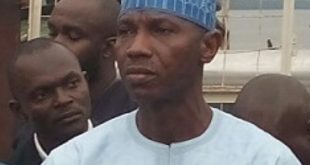By Dr. Eugene Nweke.
In my Global Trade Review, released last quarter October,2018, I did raise issues and concerns of note having gone through the proposed Africa Continental Free Trade Area (AfCFTA). I also requested the management of the Council for the Regulation Of Freight Forwarding Practice In Nigeria (CRFFN) to study the said agreement, and do a professional review, to be followed by a position paper for the attention of the President and Commander- In- Chief.
Whether this professional advice was adhered to or not, I can not say, but critical issues on the news airwaves is the signing into law and the subsequent constitution of the a steering committee for the implementation of the AfCFTA.

In the recent news headlines, the CRFFN is seeking for an inclusion into the steering committee.
As a Professional practitioner, I deem it necessary to weigh the pros and cons, the merits and demerits of the said agreement, which is a makeshift trade tools as recommended by the World Trade Organization -WTO Trade Liberalization Scheme, propagating the gospel of global, continental and regional trade agreements.

The choice of the above theme for paper, was arrived at after a series of comparative studies on the subject of trade liberalization or free trade agreements.

Indeed, on the periphery there is no issues with the theory of trade liberalization but often times so many things are wrong in the implementation of a free trade agreements. It is commendable, to note that the President entrusted the implementation of AfCFTA to a Committee. Therefore, professional and technical issues to be addressed in this piece should serve as a guide and not to be termed a criticism.
To begin with, free trade simply means, the removal or absence of barriers to international trades, such as qoutas, and trade prohibitions or restrictions from one customs to another, or by high tariff regime. Other form of trade restrictions comes by way of controls (monopoly) on participation in particular trade imposed by corporations.
The comparative advantage theory argued that, “free trade between nations would bring gains to both parties to an exchange, even when one was the more efficient producer of every good they traded. This was because trade encouraged even an unproductive national economy to devote resources to those branches of production in which they would be least inefficiently employed.” On practical terms, it is not even straight as stated, which is part of the concerns of this modest piece.
According to Benjamin Barbers, “Global economic forces weaken the national state in developed areas where it is most democratic and strengthen it in the third world where it is least democratic, imperiling liberty in both cases.” This draws my attention to the principles of trade equalities and unlevel playing field in the eyes of competitive trading practices.
Firstly, I have to do a rethought on this general statement that, “The man who builds a factory builds a temple, and the man who works there worships there”, but given to the fact that, globalization was taunted to make democracy more innocuous, propelling the elites and politicians to become more powerful and democracy to become less redistributive except for new form of representation with zero tolerance to corruption and greed, whereby a developing nation enjoys universal suffrage at unprecedented legitimacy, as such the man who builds factory in the latter years are motivated by greed, and prone to corrupt practices.
It is a global norm for a responsible nation to go into trade agreements with the sense of attained efficiency, predictability, calculability and control to guide and drive all relevant sectors in this regards.
In buttressing my rethought with the America and West Indian Banana Industry under a free trade regime, as a start off case study:
According to Orville W. Taylor: The World Trade Organization – -WTO specific agenda of establishing common standards relating to international trade, introduced a regime which prevents a country from enjoying preferential treatment and from implementing protection of its own industries with a commitment to promote free trade and capital, encourage members nations to remove imports restrictions.
In a nutshell, the WTO attempts to creates a status quo resembling what economists calls, “perfect competition”, eliminating unfair advantages to any member State. Unfortunately, it is only on the surface of paperwork that it appears to be just, but in practical terms it is more of projecting what the American ideology underlined as it’s principles of equality.
The WTO is a body just like the International Monetary Fund and the World Bank dominated by America interests. On a deeper examination, it reveals a bias that causes concerns to developing nations; reason being that it does not place labour issues on its agenda, which is more than incidental omission.
The WTO when confronted with the labour issues, came up in 1996 with its own role ( -WTO -51), identifying the International labour Organisation(ILO) as the competent body to deal with labour standards, knowing that, the ILO does not have the powers to sanction countries for breaching core labour practices and standards, given that labour practices and standards are cost related.
With this imbalance between enforceable standards related to trade and none for labor, investment will conveniently move in the direction of countries where workers operate under sub standard terms and conditions of employment.
Suffice to say that this assertion is backed up with the following case scenario in the Caribbean and West Indian Banana industry:
The West Indian producers are vulnerable and have difficulty competing with the American companies based in Latin America. West Indians, apart from having higher transportation and production expenditure, have labour standards that are better than that of Latin American countries, as well its labour costs are higher than that of Latin American countries. In addition, the West Indians utilize more organic productive and pest control methods, thereby meeting a more environmentally friendly States(FOE-2002).
As provided under the WTO rules, pressure was mounted on the Caribbean Banana industries to compete “Fairly”. In 1997 a motion was brought before the WTO to remove the preferential treatment that the Caribbean Banana was receiving from the European Union (EU). The Caribbean Banana was receiving specialized access, courtesy of qouta to the European and in particular the British market since the post world war II period.
Recall that in the West Indian region they entrenched labour democracy and had a symbiotic between its trade unions and political parties whereby the workers in this area have legislated rights which workers in other developing countries or third world countries do not have. Therefore, with higher labour standards, it is difficult to compete with other countries in Latin America that practices loose labour standards.
Following the pressure mounted and insistence for “Fair Competition” on the WTO, from other countries covered under the trade agreements, the case was brought forth by the United States government, even though none of its citizens was affected.
Investigations revealed that the government was taking the action due to the interest of Chiquita Banana, which was owned by an American, but located in Central America. Interestingly, this particular “Entrepreneur” is the largest contributor to the Democratic and Republican Parties, hence, the political economic consideration.
According to a Fact Finding Mission of the European Parliamentarians in 1997, the loss of the Banana trade with the EU would have “devastating consequences for the livelihood of hundred of people across the Caribbean, for instance, in Dominican Republic , the Banana industry contributes 60 to 80 percent of its foreign earnings, employing, half of its labour force”.
There are other cases scenario of equal reference, but for want of space. Notwithstanding, for mention sake, it is note worthy referring to the paper presented by Montrope and Taylor(2002), on the argument in relation to the trade impasse between the EU and WTO over the Chiquita Banana industry controversy, which was tagged as “Internationalizing racism”.
Without delving deep on the argument, or reviewing the subsequent ruling of the WTO against the EU and the Caribbean Banana industry, which the WTO judged as to have a likely “ironic effects”, it is important to state that, apart from the impact of the WTO led globalization on the Banana industry, all sectors in the Caribbean economy have felt the effect, namely:
a). Coping with inequity, inequality caused by the enforcement of trade standards, but not for labour.
b). Employers of labour resort to collaborations with the regional governments to chart a new trend towards employing contract labour.
c). Workers employed under these contracts are traditionally not covered by most of the statutes which give basic rights, such as paid vacation, sick leave and protection from arbitrary employment, and no severance package, especially in the tourism and security sectors.
d). Resultantly, this pressurizes the real wages and an increasing inability of the labour force to subsists from wages.
e). Ultimately making paid employment less desirable and push marginal members of the workforce towards other activities, especially migration, as next and real alternative.
CONCERNS AND EMPHASIS FOR AFCFTA STEERING IMPLEMENTATION COMMITTEE
1. Identify and underline the intention and unstated Interests of the promoters of the free trade agreements.
2. Often, be weary of the objective and certain insertions into the trade agreement, on face value, trade agreements seem perfect, but a different ball game in implementation.
3. Evaluate the supply chain value system in all industry facets and strata, place labour concerns as a key agenda.
4. Most participatory countries to the trade agreements, already have an existing bilateral/ multilateral trade agreements with foreign firms, as such the principle of comparative advantages, should be properly defined.
5. Progressively raise bars and monitor cases of arbitrariness and preferential treatment, inequity and inequality practices.
6. In every trade agreements, directly or indirectly developed Nations interests come in disguise, as such, there should be caveats or clauses that should occasionally give rooms for “Voluntary Exports Restrictions – VER”. The same manner of restrictions was deployed by the developed countries to protect and develop their local industries, before the introduction of trade liberalization scheme.
LESSONS, CONCERNS FROM THE PAST IMPLEMENTATION OF TRADE LIBERALIZATION AGREEMENTS:
During the ECOWAS Trade Liberalization Scheme (ETLS), renegotiation in 2011, I posited the followings to guide the representatives to the negotiation:
1. If free trade agreements are not adequately structured and monitored to meet local peculiarities, it opens a window for further flooding of the markets with substandard, counterfeit and fake products produced offshores, that compromised quality standards, production process and labor best practices – resultantly, it leads to disastrous prices falling, making the locals unfits and unable to compete with such offshore products.
2. Government has the constitutional obligation to protect, support, encourage the commoners in their respective small or medium scale business interests.
3. Farming and farmers constitute and are critical sectors that requires serious protection against any threatening foreign trusts, such as entering into a trade agreement. Naturally, where the benefits of a trade agreement is not adequately communicated fears and doubts are entertained.
4. Eventually such alluded fears mushrooms into widespread public agitation against artificially raised prices, thereby limiting the opportunities and interests of the struggling farmers/small scale companies.
5. To this end, government must streamline regulatory agencies obligations, to guide against duplication and wasteful competitions, so that each industry maintains a supply value chain, that could keep prices down and prevail against offshore rivals, which the agreement implementation will throw up.
6. In view of the above, thousands of small, medium and large companies that could not withstand the unregulated substandard foreign products price environment, or foresee hope to survive, will steadily close up voluntarily, except in rare cases rescued or reacquired by the commercial banks or taken over by other firms.
7. There is therefore the need to redefine the Nigeria industrial fabric. Government should shield small businesses and major businesses from the monopolies and excess of “international robber baron and their national allies, aka malefactors of great wealth ( indigenous cum foreign conglomerates) who exploits the political fabric, ply and by proxy penetrates international bodies to do their business biddings through the trade or treaties.
8. At present, Nigeria’s trading environment is already caught up with fragile, over leveraged structures, created by the robber barons, as a result tumbling and erasing the life savings ( no thanks to capital flights and inflation) of thousands of small investors; as most of the robber barons or malefactors, operate and parade themselves as above laws, in a weak regulatory environment.
9. Deliberate efforts must be deployed to weigh the impacts of overzealous production by factories owners who desire to gain entry into the local market with ulterior motives, to avoid massive economic reversal that will results to financial depression.
10. Caution must be taken, mostly in the face of increasing unemployment and poverty rate as well as societal ills, business owners are no longer the high priest of prosperity, rather they are pariahs whose evil speculation are transferring the Nigerian dreams into nightmares, on account of greed, compromise and corruption.
11. As referenced in 1 above, the cutthroat competition styles and intent of participants to the free trade regime is often driven by deliberate connivance and plotting to enslave the commoners and belabouring the local traders. They initially sold their substandard products at prices far below any competitive pricing range, in order to dwarf and drive the locals un-competitiveness over the brink, once they succeed, gradually, they recoup their perceived losses by raising product prices, having monopolized the market and garnered customers on their side.
12. Going forward, government should uphold and exhibit a high degree of centralized economic planning and commitment to business intervention as prompt as possible. Often, the driving force behind free trades is to weaken the Customs imports and exports tariff/valuation of developing countries, an indirect way of seeking for a lenient tax regime in the international trade supply chain.
13. It is on record that, the free trade agreements propagandist push more on what they believe should be the right to produce a subtle hidden songs of intent, while singing aloud the songs of free trade.
14. An implementing agency must consider such variables as critical component that cushions the population factor. The faster the population increases more than the supply of goods available for their needs, it subdues living standards to unsustainable level.
15. Market forces are expected to be a driving factor to product pricing and demand, but free trade puts pressure on local trading interest, as such implementing agencies should evolve the basis on what constitutes “competitive cost and selling price” without undue pressure from the foreign interests, whose sole aim is to weaken or suppress its interests.
16. In order to harness the national commercial/economic potentials from a given trade agreement, implementing agencies should collaborate with a specialized and experienced agency with the capacity to moderating and protecting the interests of the Nigerian shippers.
17. On a note of national reflection, let me share the ancient reasoning on trade inequality and unlevel playing field:
“The power of old world was human power, everything depended ultimately upon the driving power of human muscles, the muscle of ignorance subjugated men. This was a joyless situation, other than emancipation expected by the machine age and the expected increase in trading competition.
The mills had no need of skilled workers who became destitute or accepted the degradation of a factory job, where they were broken in status from respected craftsman to anonymous industrial peasants.
The mills paid a good wage by the standards of unskilled labour, but one still too low to allow a man to support his family.
Finally, is to pose this important question to the government:
a). How competitively ready and prepared are the Nigerian manufacturing, farming, trade and services industries?.
b). Has the government created an enabling environment for effective industry competition?.
c). How effective is our product quality assessment and conformity standards, trade practices, and price regulatory agencies?.
d). Are the news factors of production readily available? Do our various industries enjoy adequate and prompt public energy supplies to power productions?.
e). Can our labour policy withstand a competitive industry practices?.
f). Has the government taken adequate consideration and measures with regards to unemployment and security concerns?.
Trade agreement is not aimed to satisfy the business interests of foreign nations and their nationals, but to carter for the well beings of the nations and citizens. Don’t compromise local economic development and potentials. Let’ us look at the ECOWAS TRADE LIBERALIZATION SCHEME with a deeper concern.
NOTE: Unfortunately, almost all that were enumerated above played out in the ETLS implementation. ETLS implementation in the past almost ten years, opened our economy to smuggling, capital flights, inflation, influx of substandard and counterfeit products, insecurities, threats, etc.
BEYOND AFCFTA IMPLEMENTATION – CLARIFICATION, FOCUS AND CONCERNS:
From the perspective of a professional freight forwarding practitioners, having revisited the AFCFTA,
enough time, was taken to study the following trade agreements, the implementation and reported thereof;
a). North American Free Trade Agreements – NAFTA.
b). Nanking Treaty.
c). Trade Related Intellectual Property Rights Agreements – TRIPS.
d). Trade Related Investment Measures Agreements – TRIMS.
e). General Agreements On Trade In Services – GATS.
f). General Agreements On Tariff and Trades – GATTs.
g). Transnational Corporations Agreements – TNC.
h). Multilateral Investment Agreements – MIA, etc.
I will for the sake of national interests plead with the steering implementation committee not to lose sight of the following trade economic concerns, as time may not permit for detailed explanations. However, the emphasis is that, Nigeria’s participation in AFCFTA, the steering implementation committee, should for the benefits of the listed concerns and for the sake of national growth, may recall that in an ideal trading environment, trade agreements consider the importance of negotiating tools such as: Local Content Requirements( where TNCs are required to buy more than a certain share of inputs from local producers), Export Requirements ( where they are forced to export more than a certain proportion of their output) and Foreign Exchange Balancing Requirements(where they are required to export at least as much as they import):
a). The pros and cons of protecting infant industries in agriculture.
b). The pros and cons of Import Substitution Industrialization – ISI.
c). The pros and cons of Intellectual Property Rights – IPR, Counterfeit goods, patent rights.
d). The Laws and Conventions with respect to foreign exchange control.
e). Comparative free market policies, bureaucratic competence and development.
f). Develop measurement indicators for growth rates and expense protecting foreign Interests in a free trade agreements regime.
g). Reassess our Heavy and Chemical Industrialization – HCI programme
h). Review the controlling stakes, especially aggressive protection on the following industries: Dairy, Garment, Cotton and other Farming, Electronic, Electrical, Pharmaceutical, Mining, Plastics ,etc
I). Revisit the effects of trade liberalization on government revenue and export production quality standards.
j). Raise a mechanicsm to identify government linked company – GLC in relation to capital flights and inflation practices.
k). Evaluate the technological development and technology protection flow in relation to essential services and value chain system inherent.
l). Pencil down possible brown fields and green field investment consideration.
m). Highlight time scale, evolve collective investment funds and balancing interests.
n). Weigh the effects of prevailing deregulation and corruption inherent.
O) Collaborate with the Natural Resources and Standards of Living Agency or Commission to measure the yearly Consumer Protection Index – CPU.
p). Measuring manufacturing output, listing ways of regulatory
q). Stating conditions for accepting policy summersault, nullification crisis, etc.
r). Stating conditions governing national monopolies, unhealthy competition and transfer pricing structures.
s). Set up mechanism for improving monitoring performances between service and manufacturing economy, etc.
t) Develope tool for constant monitoring of microeconomics policies, etc.
u). Set conditions for special and deferential treatment – SDT application where necessary.
Note that, “Premature opening or exposing of the economy to free trading activities, without having in place a well developed and well supervised financial sectors, good regulatory institutions and sound macroeconomic policies can hurt a country by making the structure of the inflows unfavorable and by making the country vulnerable to sudden stops or reversal of flow”.
2). “Allowing easy parallel imports may result in some reverse inflow of cheap products from other developing countries before the end of Intellectual Property Rights, IPR (incubation) life”.
3. Price stability is of course an important part of overall economic stability, but the stabilities in output and employment are also important”.
Finally, the implementation steering committee should embrace this task from a larger perspective of national economic development and protection. Most of the concerns expressed and noted above may not apply if the committee chooses to limit its assignments within the windows of the agreements, such resolution may not inject the needed tunics to drive the process for national well beings.
I wish the Implementation steering committee members well, in this herculean tasks ahead. Always remember the lives of millions of Nigerians have been entrusted into your hands. It is my desire that you find this modest a complementary working tool.
May God bless the Federal Republic of Nigeria.
Dr Eugene Nweke.
Sea Empowerment And Research Center – RGT
 MMS PLUS NG – Maritime, Aviation, Business, Oil and Gas News Online Newspaper with coverage in Maritime, Oil and Gas, Aviation, Power and Energy as well as Financial News
MMS PLUS NG – Maritime, Aviation, Business, Oil and Gas News Online Newspaper with coverage in Maritime, Oil and Gas, Aviation, Power and Energy as well as Financial News










